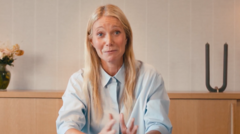As women increasingly take on roles as economic providers, the risks of financial abuse grow, with Dr. Ndaba highlighting the need for awareness and education to combat this issue.**
Exposing Financial Abuse: A South African Doctor’s Call to Action**

Exposing Financial Abuse: A South African Doctor’s Call to Action**
Dr. Celiwe Ndaba's viral videos reveal the hidden dangers of financial abuse in marriages, sparking national discussions in South Africa.**
A young South African doctor has ignited a nationwide dialogue about the often-overlooked issue of financial abuse, as shared through her powerful social media presence. Dr. Celiwe Ndaba's recent viral videos candidly recount her own experience of being financially manipulated by her husband, leading to their separation.
While driving to work, the mother of three revealed how, despite having a successful career, she found herself entrenched in a toxic relationship where her financial contributions primarily fueled her husband's aspirations — particularly his desire for luxury vehicles like a Mercedes Benz. She recalls that facilitating loans for such purchases was a grave mistake that severely strained their family's finances. After putting her foot down and refusing to support his lavish lifestyle any further, her husband exited their marriage.
Dr. Ndaba’s story struck a chord across social media platforms, where numerous women began sharing their experiences akin to hers, thus creating virtual support communities. “You are brave to speak out so publicly… I have been suffering in silence,” one follower remarked, illustrating the silent struggles many women face in similar situations.
Legal experts in South Africa interpret financial abuse as a subtle yet damaging form of domestic violence, categorized legally as economic abuse under the Domestic Violence Act. According to Bertus Preller, a Cape Town lawyer, this manipulation typically involves denying access to funds needed for essential expenses or disrupting shared financial resources. This reflects a broader societal issue where women's newfound financial independence often clashes with entrenched cultural norms that favor male authority, making them vulnerable.
One anonymous university lecturer discussed her own tormenting experience, detailing how her husband's deception about his qualifications resulted in her financial demise. Her story highlights how financial abuse can escalate subtly, leading to situations of severe economic dependency and emotional trauma over years of manipulation.
Experts note that both abuser and victim dynamics often stem from deeply rooted psychological issues. Financial control can often leave victims feeling worthless and trapped — making the process of liberation much more challenging. Compounding this, students from the University of South Africa found that women who out-earn their partners exhibit a heightened risk of various forms of intimate partner violence.
As Dr. Ndaba's disclosures unfold, women from various backgrounds continue to share personal anecdotes, revealing common themes of financial exploitation and strain on familial relationships. The prevalence of such experiences, especially among middle-class women in South Africa, underscores a “double patriarchy” experienced by many — one that marries cultural expectations with economic independence.
Nombulelo Shange, a sociologist, identifies a worrying trend wherein society places the burden of maintaining harmony within family systems squarely on women, compelling them to negotiate their identities as both caregivers and breadwinners.
Following Dr. Ndaba’s revelation, conversations emphasizing the importance of financial dialogues between partners have gained traction. Observers encourage women to safeguard their finances, maintain independence, and dissolve the misconception that love carries an unsustainable price tag.
Through her courage, Dr. Ndaba has not only raised awareness but has also prompted an essential discourse on the critical intersection of finance, power dynamics, and relationship health, urging women to discern their self-worth beyond monetary confines.


















